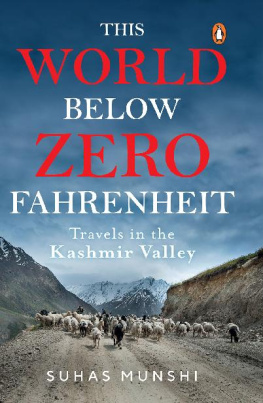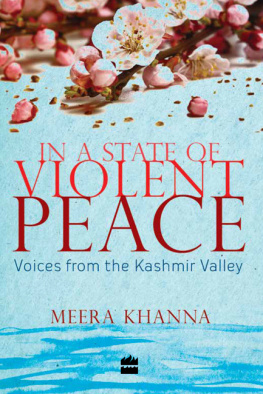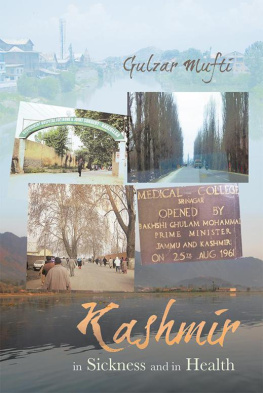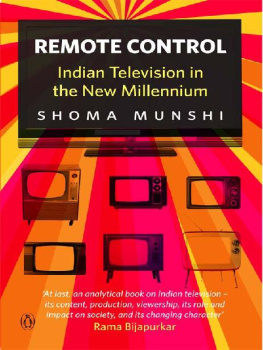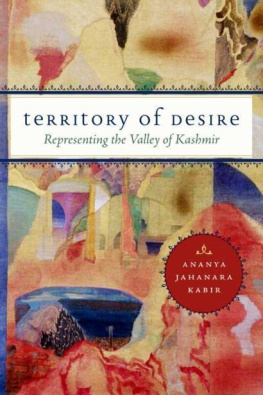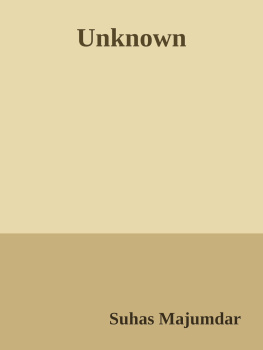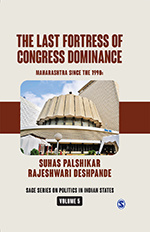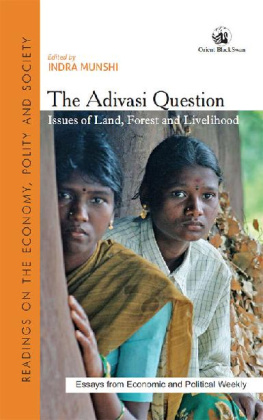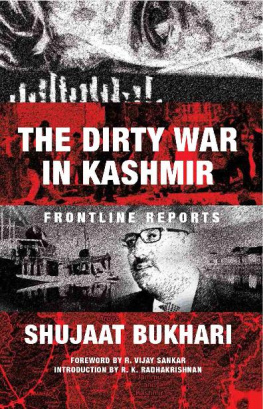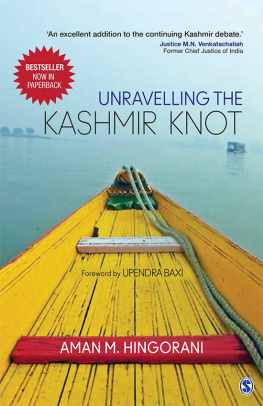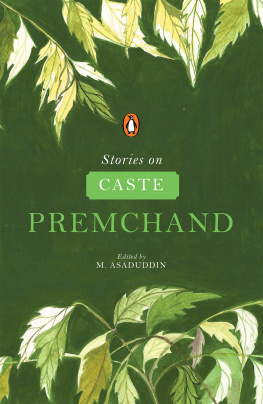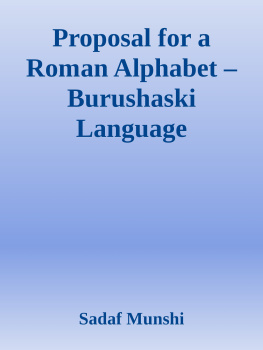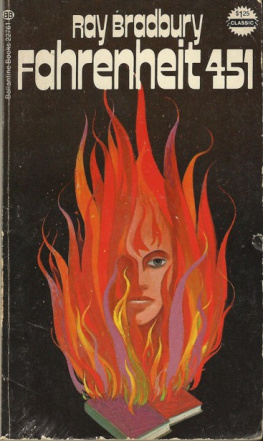SUHAS MUNSHI
THIS WORLD BELOW ZERO FAHRENHEIT
Travels in the
Kashmir Valley
For my family and friends,
and for Sana
Contents
Introduction
This is not a goddamn Heaven.
Many years ago, a close friend called me up, fuming at a run-of-the-mill piece on Kashmir. Why do they keep saying it? We live here. We are not dead yet. I knew what he meant. The clich wasnt just off-putting. It was corrosive. It reduced a living place to an amusement park. Heaven. When Kashmir wasnt that it was a geostrategic something or a battleground xxx. Every time such a clich was uttered, Kashmir and its people grew a little more distant, more abstract. My friends words remained somewhere at the back of my mind. Which is why I couldnt help but share a chance encounter I had with a Kashmiri man returning from a regular nine-to-five shift. And the conversations I had with elderly football enthusiasts, actors, poets, shepherds and ambitious young men and women, some of whom were fighting for their identities like people anywhere else in the world. To them Kashmir was only a home, with all its imperfections.
To Ali Mohammad, a cobbler who has been sitting in front of the old Tyndale-Biscoe School at Lal Chowk for the past twenty-five years, it is the best place in the whole wide world. Though, by his own admission, he has never travelled beyond Jammu. He likes it despite the fact that in these twenty-five years, a lot of people who used to push carts for a living have now become very rich. Some of them are even driven to their shops in expensive cars. It hurts because the place where I sit, my brother-in-law sat for fifty years before me. Fifty plus twenty-five is how much?
Seventy-five.
Exactly. For the last seventy-five years, we have been sitting in this corner of the road mending and polishing shoes. What do we have to show for it? Just a two-room house in Batmaloo. He blames it on his stingy customers, the Shikaslads [which means the bringer of misfortune and is often used as a term of mild abuse], whom nothing can cure, not even the air of Lal Chowk, which our elders would say was the remedy to all ills.
When I started work on this book, a little over two years ago, I did not have any grand, connecting theme in mind. I only knew what I was not going to write aboutviolence (and I failed even at that). The moment it became central to any story, violence had a tendency of eclipsing everything else. The best way to deal with it was probably through allusion. Something of the sort that had been done in Valley of Saints , a movie on Kashmir, set in Kashmir, which had won many international awards, including two at the Sundance film festival. Theres a scene in it in which a character, Afzal, is trying to cheer up his friend Gulzar. As theyre lying in bed, Afzal thinks of an actmimicking corpses. The way a person looks in death depends on the way they die, Afzal says. He plays the part of a person who has been shot to deathlimbs bent at unnatural angles, a bit of flesh showing around the waist. Its as if in that frame, for a second, he becomes, at once, all the people who were gunned down in the valley.
I met and wrote about Afzal, whose real name is also Afzal. We talked about the big international film festivals he had attended, his passion for films and for teaching film-making to his college students. Then he mentioned one day of his life, every second of which he said he remembered with absolute clarity. It was the day when he saw his fathers body disfigured by bullets. This was in the early 1990s, when Afzal was only thirteen years old. He grew up in what was one of the most traumatic periods in Kashmirs history. Like him, a lot of other people I spoke to for this book had grown up seeing their lives fall to pieces. The one thing I was determined to avoid kept catching up with me everywhere I went in Kashmir .
But there were moments of joy and love as well, such as those I experienced in a church in north Kashmir on Christmas eve, when there was nothing as dangerous for miles around as the freezing cold. And sometimes it got even better. That bright, sunny day, for instance, when I was in south Kashmir sitting with an old Kashmiri Pandit, O.N. Bhat, as he recalled stories from his childhood. One of them was about Mahatma Gandhis visit to Kashmir. According to Bhat, Gandhi had delivered a speech about the poverty of the ordinary Kashmiri who was so broke he could not even afford a langot [loincloth]. Langot, repeated Bhat. It was really funny how he said it. We couldnt stop laughing for a long time.
The place where he lives, Hal in Shopian, was once home to around 100 Pandit families. All of them fled the valley to escape religious persecution. From the window of his first-floor bedroom, Bhat can see the abandoned houses crumbling under their own weight. What used to be his living, thriving neighbourhood is a ghost town today. His is a strange kind of exile. Despite having stayed, hes as far from his homethe one in which he grew up, got married, started a familyas my grandparents, who had to, very late in their lives, leave the houses that they had put together brick by brick, and anchor their families in strange lands. They loved to talk about their lives before the exodus. It often started with someone asking, Do you remember... and a whole night would pass just like that.
Daniel Mendelsohn, the great essayist, in An Odyssey describes the genesis of the word nostalgia. One of its roots is Nostos, the Greek word for homecoming.
In time this wistful word nostos, rooted so deeply in the Odysseys themes, was eventually combined with another word in Greeks vast vocabulary of pain, algos, to give us an elegantly simple way to talk about the bittersweet feeling we sometimes have for a special kind of troubling longing. Literally this word means the pain associated with longing for home, but as we know, home, particularly as we get older, can be a time as well as a place.
It really surprised me, when I first went through the finished draft, to find that I had spoken to and written about so many old people. Im not sure what the reason was for this. Maybe in trying to avoid writing about pain and anxiety and physical hurt, with which the valley is brimming right now, I was drawn towards a time when Kashmiris took their lives more or less for granted, and only our elderly knew what it was like then. Also, there was no doubt that these links to our shared history werent going to be around forever. The memory of Ghulam Rasool Dar or Lassa, for example, who has lived such an eventful life, is already failing him.
I met him on his boat, Stranger in Paradise. It was the last interview I did for the book. When I met him, he insisted that we speak only in English. He had an impressive grasp of the language despite never having been to a school. I been working as a shikara man for last fifty-two years, he said. He recalled taking Pandit Ravi Shankar and George Harrison for boat rides on the Dal. I think it was 1966. It was like a dream. Both of them used to go with me for boating. Both of them smoked a lot. He met the famous Bollywood actor Dilip Kumar, whose wife, he said, was very scared of water. She stayed separately. Dilip Kumar stayed here, in our houseboat on the Dal. He talked about helping out many documentary filmmakers and journalists. Michael Palin also came here. You can watch his documentary. I am in it, he said. I looked it up on the net. Lassa is really there, sitting in a shikara, chatting with one of the Monty Pythons!



